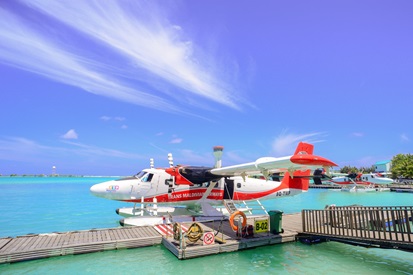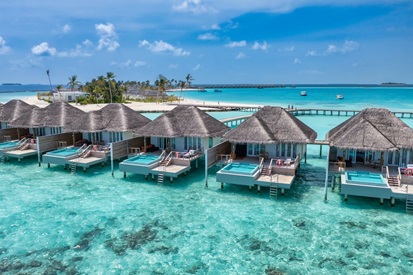

Soon the paradise islands will be able to offer not only holidays in luxury hotels, but also luxurious apartments. It seems that the Maldivian authorities have found a solution to the problem of rising sea levels. This could be the construction of a floating city right on the Indian Ocean.
The floating town will be built as part of a government program that recently received the green light. The unique project involves the construction of 5,000 residential buildings that will be interconnected. They will be fixed at the bottom of the lagoon, using 2 million sq.m! The city will be able to accommodate 20 thousand inhabitants.

dutchdocklands.com
Maldivian Venice: the concept of a city on the water
The floating city will appear just 15 minutes by boat from the capital of the Maldives, Male, and the nearby international airport. This will make the new city convenient for tourist trips, since most planes land in the capital.
One of the key factors in the success of the project is the unique design developed by Waterstudio and the use of natural principles. As the project developers explain, the residential platforms were modeled after the shape of the local brain coral coral, which allowed us to achieve optimal stability and efficiency. From above, the building really resembles a brain, creating a unique visual image.
One of the main advantages of such architecture is the ability to move, which allows the location of the city to change depending on changes in sea level and other factors. Thanks to this approach, the Maldives will be able to escape the problem of climate change and withstand possible floods due to rising sea levels.
However, city design is not limited to just appearance - it also includes strategies to preserve and maintain the local ecosystem. Specifically, artificial mounds will be attached to the underside of the floating city to encourage natural coral growth. These mounds will play an important role in creating conditions for coral to live and reproduce, which can attract a variety of marine fauna and flora.
The unique project is based on an integrated tourism model. The floating city will feature hotels, houses, shops, and restaurants. But the main feature of the eco-city will be the absence of cars, which will eliminate the possibility of environmental pollution. Guests and residents of the overwater city will be able to navigate the canals by boat, walk along natural roads with snow-white Maldivian sand, ride bicycles, silent electric buggies and scooters.
The city will mainly generate solar energy. Waste will be processed on site, and waste water will be treated and reused to irrigate plants as fertilizer. Deep sea refrigeration will also be used to provide air conditioning.

dutchdocklands.com
When will a city on the water appear?
Another feature of the project will be the possibility of obtaining a residence permit in the Maldives when purchasing real estate in the floating city. The first floating residential unit, which is being built by Bison, will be delivered to the lagoon and open to public viewing later this year. This way, potential buyers will be able to evaluate the appearance of the buildings. Construction of the modular town is planned for 2023 and will take about five years. A studio in a city on the water will cost from $150 thousand, a house for a family - from $250 thousand.
The Maldives floating city will be a great example of how tourism can coexist in harmony with nature without harming the ecology of the region. The project has already been highly praised by the international community and received the MIPIM Awards 2022.
It will be an example of the introduction of innovative technologies that can be used to create climate-resistant cities. Dutch Collaborative Efforts Docklands and the Maldives government have enabled the use of advanced technology from the Netherlands to create the city of dreams.

Asad Photo Maldives
By the way, floating architecture is becoming increasingly popular in light of global climate change. The latest innovations include the floating Waterbuurt district in Amsterdam and floating hotels, which have already begun to welcome guests in Copenhagen and Paris. This approach could become an alternative for our cities, which must adapt to new climatic conditions.
More articles
- Indonesia's National Parks: 15 Amazing Reserves
- 17 Temples in Bali You Must See
- Hot Springs in Bali: Which and Where to Visit
- Indonesia's Natural Attractions: 18 Places Worth Seeing
- Meru Betiri National Park in Indonesia
- The Most Interesting Routes in Bali: 12 of the Best
- Mauritius in Winter: Weather and Top Attractions
- Samosir Island in Sumatra: All About Vacationing
- The Maluku Islands in Indonesia: All About Vacations
- 10 Unique Facts About Indonesia



